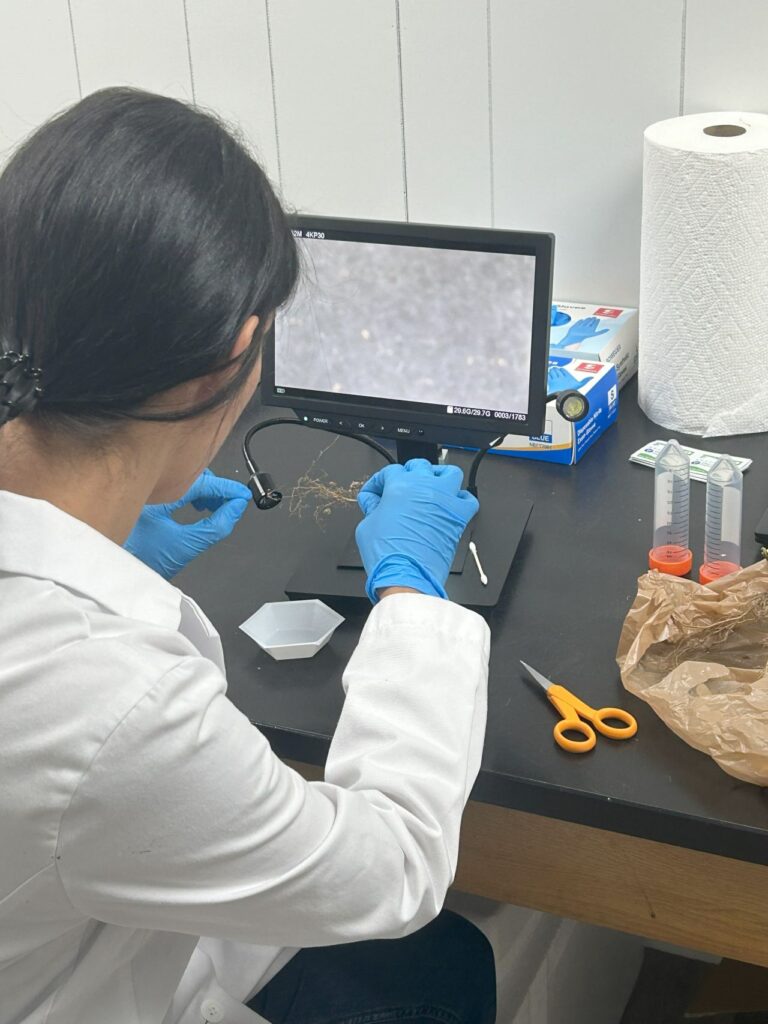
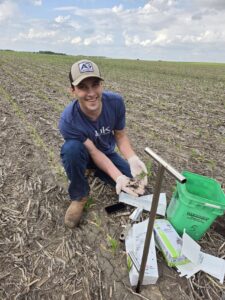
Roots to Shoots
A Multi-Growth Stage Look at Biological Efficacy
Uncover how biological treatments truly perform at each growth stage—giving you the in-depth data needed to optimize inputs, support plant health, and maximize returns
- Shotgun Metagenomic Analysis: Capture every significant microbe, not just known strains.
- Soil Chemistry & Health Metrics: Understand nutrient cycles and key soil indicators.
- Plant Tissue Data: See how nutrients actually move into the crop.
-
Multi-Stage Approach: Evaluate performance from early growth
(V4–V6) through harvest.
What is Roots to Shoots?
Roots to Shoots™ is RhizeBio’s multi-stage soil and crop analysis program, using metagenomic data plus soil and tissue testing to uncover how biological inputs truly perform.

Evaluate Treatment Efficacy
Compare biological products in real-world conditions—treated vs. untreated—across multiple growth stages.
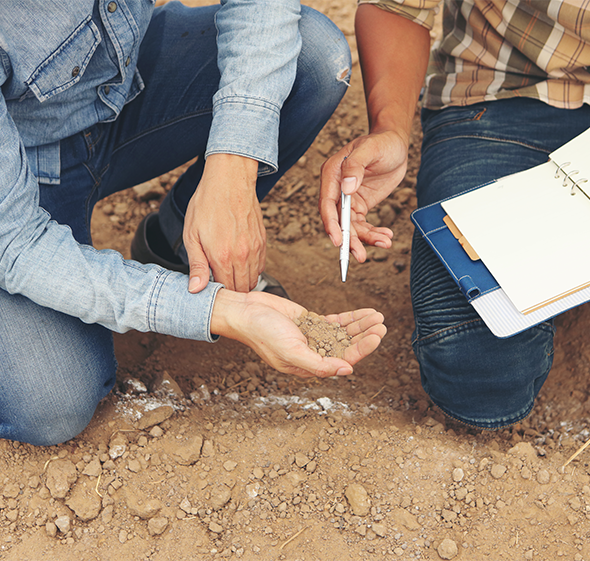
Assess Nutrient Cycling
Identify key microbes and gene pathways driving nitrogen, phosphorus, and carbon cycling, allowing data-driven fertilizer decisions.
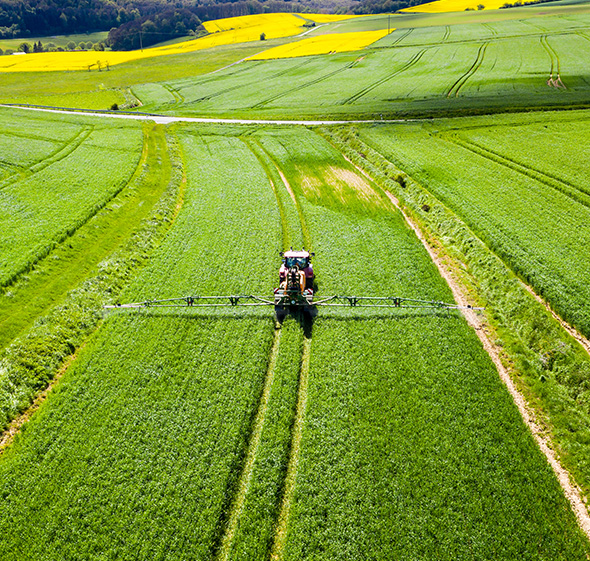
Predict Soil & Plant Stress
See how shifts in microbial diversity and root health correlate with disease resistance and overall plant resilience.

Make Confident Decisions
Pinpoint high-return amendments, reduce guesswork, and invest in products you know actually work for your fields.
Why Choose Roots to Shoots?
RhizeBio is committed to empowering you with all the soil testing services needed for fertile soil.
Prove Your Product Works
Validate your biological input under real-world conditions, comparing treated vs. untreated areas across multiple growth stages.
Build Credibility
Leverage RhizeBio’s unbiased, multi-stage data to show growers and partners exactly how your product enhances soil and plant health.
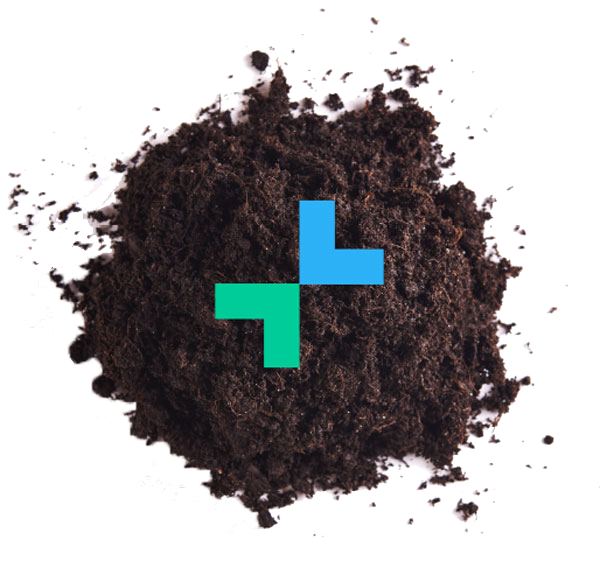
Accelerate R&D
Pinpoint effective formulation tweaks or application methods using in-depth microbial and nutrient insights from each growth stage.
Boost Your Marketing
Turn scientific results into compelling proof points—complete with reports, summaries, and visuals—showcasing your product’s real-world success.
How It Works
Learning the genetic makeup of your soil is as easy as 3 simple steps:
1. Select Your Package
Browse our Basic, Advanced, or Complete options and click Get Started on the one that fits your needs.
2. Collect & Send Samples
Follow our simple Roots to Shoots protocol to gather soil, root, and tissue samples, then ship them to RhizeBio.
3. Receive Your Report
Get a clear, data-driven summary of microbial shifts, nutrient cycling, and recommended actions to optimize your results.
- Estimated Delivery Time: 2-3 Weeks
3. Comparative Evaluation
Compare untreated vs. treated samples (or multiple products) across each growth stage.
Assess shifts in microbial diversity, nutrient availability, and plant stress adaptation.
4. Actionable Report
Clients receive a clear summary of findings, percent changes, and recommended actions for each stage (e.g., nitrogen management, product application timing).
What You Get in the Report

Evaluate Treatment Efficacy
Compare biological products in real-world conditions—treated vs. untreated—across multiple growth stages.

Assess Nutrient Cycling
Identify key microbes and gene pathways driving nitrogen, phosphorus, and carbon cycling, allowing data-driven fertilizer decisions.

Predict Soil & Plant Stress
See how shifts in microbial diversity and root health correlate with disease resistance and overall plant resilience.

Make Confident Decisions
Pinpoint high-return amendments, reduce guesswork, and invest in products you know actually work for your fields.
Basic Package
Ideal for smaller trials or initial validation
- Single Growth Stage (Mid Vegetative)
- RhizeBio Roots to Shoots™ metagenomic analysis
- Haney Soil Test + Root (DNA) + Plant Tissue at V4–V6
- Treated vs. Untreated comparison (3 replications)
- Comprehensive Technical Summary of microbial shifts and nutrient cycling
Advanced Package
Perfect for deeper insight over key transitions in crop development
- Two Growth Stages (Mid Vegetative & Reproductive)
- RhizeBio Roots to Shoots™ metagenomic analysis
- Haney Soil Test + Root (DNA) + Plant Tissue at V4–V6, plus V10–VT
- Treated vs. Untreated comparison (3 replications per stage)
- Technical Summary detailing stage-by-stage microbial shifts, nutrient cycling, and overall soil health
Complete Package
Ideal for Input Manufacturers seeking robust validation plus marketing
- Multi-Stage Analysis (Emergence, Mid-Vegetative & Reproductive)
- All Testing (Haney Soil, Metagenomic, Tissue) across each sampled stage
- Advanced Deliverables (1-Page Marketing Piece, 1-Page Technical Writeup, Presentation Slides, Webinar Session)
- Full Technical Report with data-driven recommendations
Get Started Today!
By submitting this form, I accept RhizeBio’s Privacy Policy.*
Fields marked with an asterisk (*) are required
Frequently Asked Questions
What makes RhizeBio™ different from other soil tests?
Unlike traditional soil testing that measures chemical nutrients, the Rhize Soil Health Test uses advanced metagenomic tools to measure soil biodiversity to predict function. Soil is one of the most complex environments on earth, with billions of microbes in each gram. The only reliable way to measure soil biodiversity is through advanced next generation sequencing platforms and metagenomic applications.
How does the microbiome relate to soil?
The microbiome represents all of the microorganisms that inhabit a particular environment. In the case of soil, the microbiome is complex and diverse and it functions to retain nutrients, cycle nutrients for plant availability, promote aggregate formation, mineralize nutrients, suppress disease and degrade organic and inorganic compounds. In short, a healthy soil microbiome increases crop yield and protects crops from disease and other stresses.
What is the importance of genomics in RhizeBio's approach to soil health?
Genomics allows us to understand the genetic makeup of the soil’s microbiome. This knowledge is crucial in assessing soil health and biodiversity. At RhizeBio, we use genomics to transform raw soil DNA sequencing data into user-friendly and informative soil health reports, empowering farmers to make informed decisions about their soil management practices.
How are microbes beneficial to soil and why is it important to measure the microbes in my soil?
The microbes in soil improve crop production in many ways. Here are just a few:
- Producing horomones that promote root growth
- Increasing water intake
- Adding nutrients to the soil through the breakdown of organic and inorganic compounds
- Improving nutrient absorption by breaking down vitamins and other compounds into bioavailable forms
- Improving soil structure
- Improving crop immunity
- Protecting crops from harmful bacteria, fungi, nematodes, and other pests
Still Have a Question?
Give Us a Call Today
Give us a call today at (919) 351-2038 or visit our contact page below and let us know how we can assist you in your metagenomics journey!
